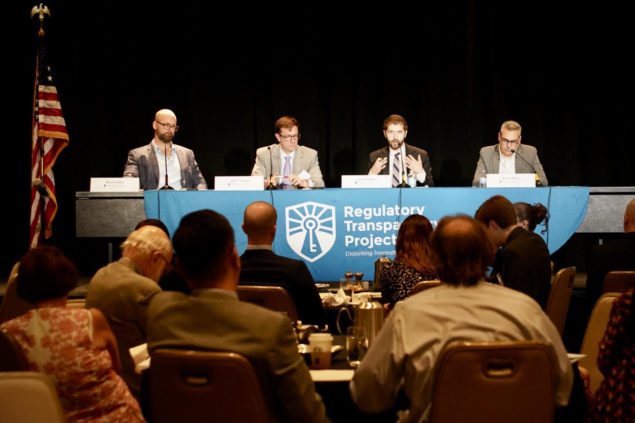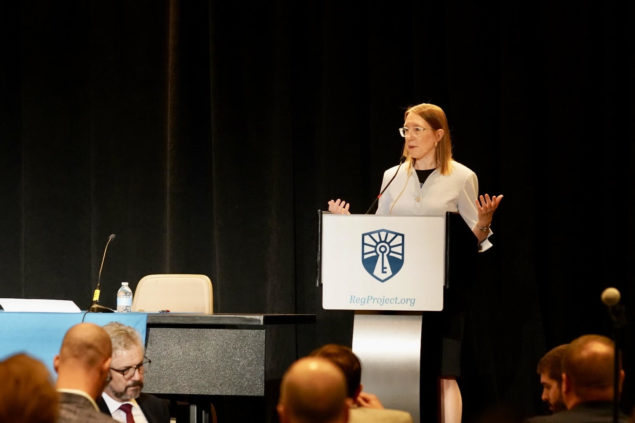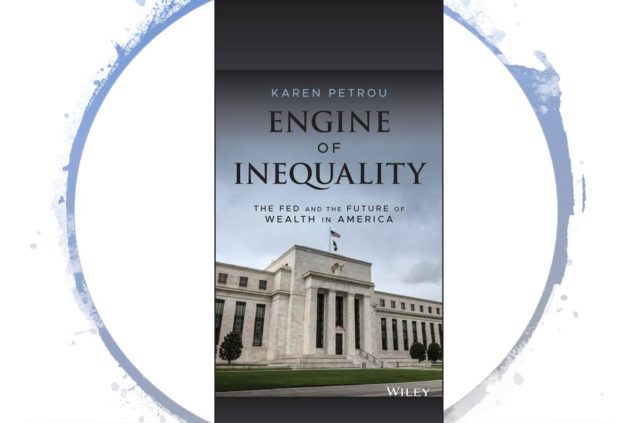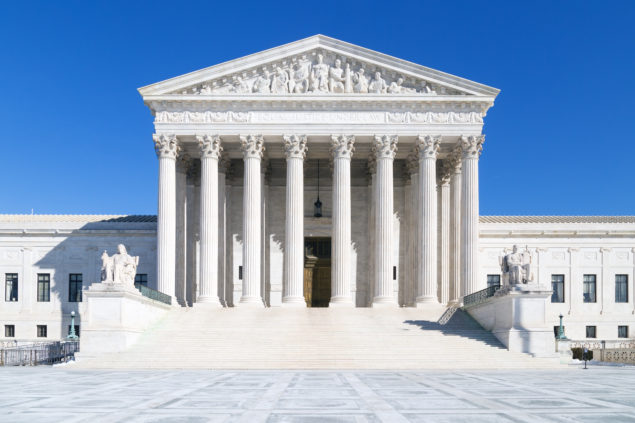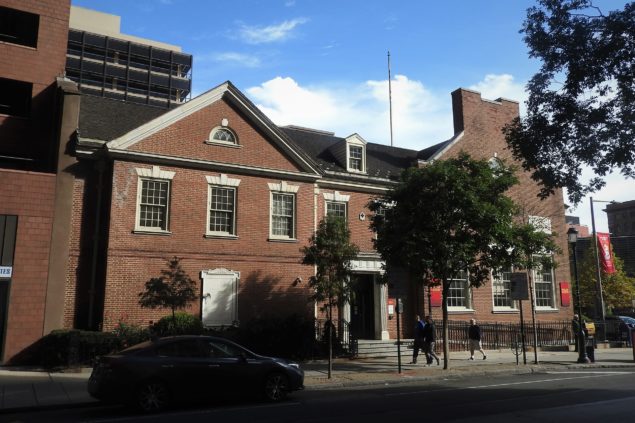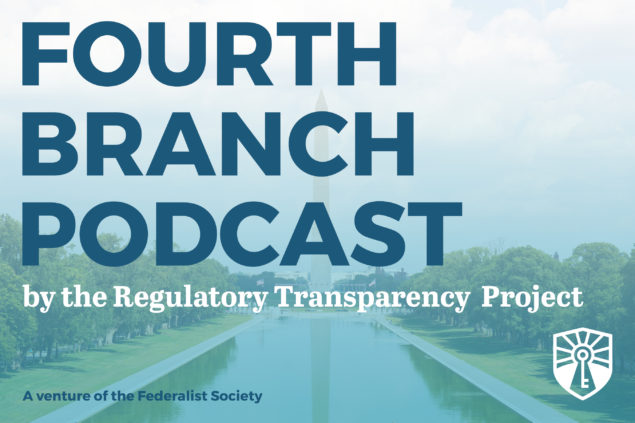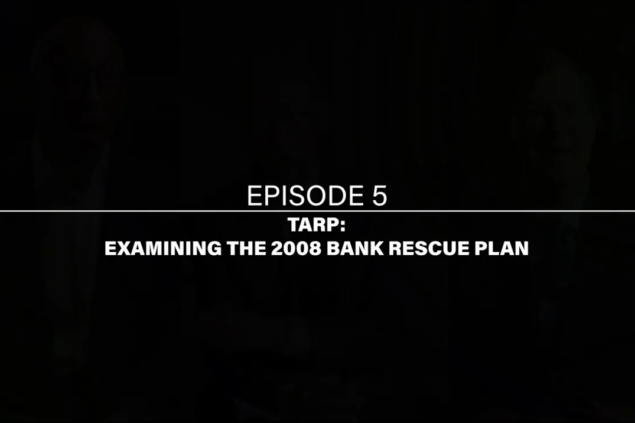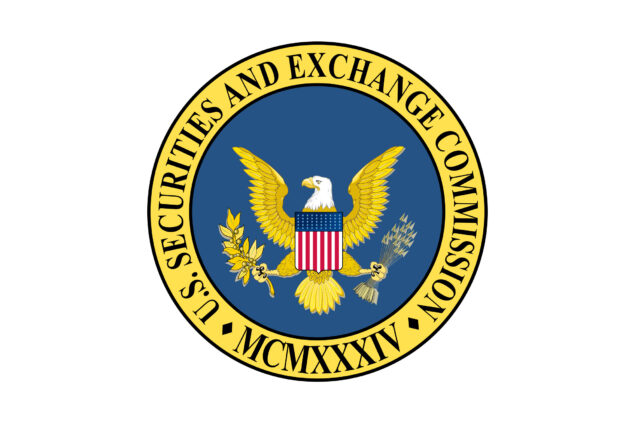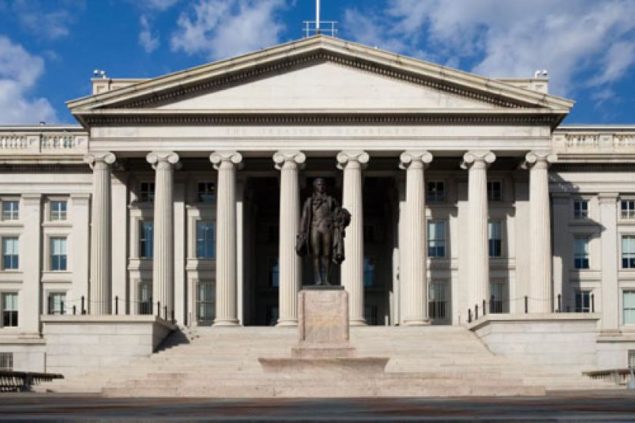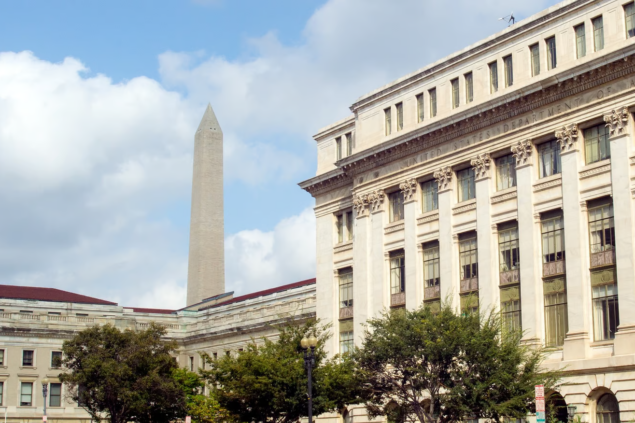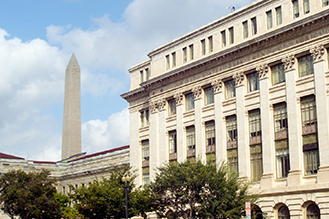Financial Services & Corporate Governance
Topics
Perhaps no industry interacts with government policy and regulation more than banking and financial services. As our nation works to build and maintain a sustainable, resilient financial system, we must learn the lessons of the past while encouraging necessary innovation. How can we best navigate these complex issues and identify opportunities for regulatory policy improvement?
Creating Pro-Innovation Fintech Regulation
In this paper, Brian Knight discusses how fintech “can improve our lives and how poor regulation risks harming the very people it seeks to help.”
Read this paperHow Risky Are the Banks Now? What Regulatory Reforms Make Sense?
Six months ago the banking sector experienced severe turmoil, including bank failures. Now the situation seems calmer, despite continuing risks. Experts discuss reform ideas like the proposed “Basel Endgame” capital regulations and provide recommendations on dealing with issues like asset losses and recession risks in the current environment.
Listen to this podcastExamining the SEC’s Approach Towards Crypto
Join us for an in-depth exploration into the SEC’s recent lawsuit against Coinbase – a case that will no doubt…
Listen to this podcastDeep Dive Episode 270 – The 2023 Bank Runs and Failures: What Do They Mean Going Forward?
This year’s sudden collapse of First Republic, Silicon Valley, and Signature banks were the second, third, and fourth largest bank…
Listen to this podcastDeep Dive Episode 265 – A Discussion on Central Bank Digital Currencies and the Future of Financial Privacy
Experts explore central bank digital currencies (CBDCs) and the ongoing debates over financial privacy, especially in relation to use of cryptocurrencies and other software privacy tools.
Listen to this podcastDeep Dive Episode 252 – Cryptocurrency Regulation in the Aftermath of FTX
The collapse of FTX has intensified the debate about how cryptocurrencies should be regulated, including proposed federal legislation.
Listen to this podcastExplainer Episode 40 – FTC’s New Strategic Plan and the Future of Agency Action
In this episode, experts discuss the goals of the FTC’s new Strategic Plan as well as the challenges facing future agency action.
Listen to this podcastDeep Dive Episode 227 – Crypto Wars: Balancing Privacy versus National Security
An expert panel debates how digital asset policies can protect freedom and privacy while maintaining safety from bad actors.
Listen to this podcastDeep Dive Episode 224 – Regulating the New Crypto Ecosystem: Necessary Regulation or Crippling Future Innovation?
At an RTP event, an expert panel addressed current and future efforts at regulation of cryptocurrency.
Listen to this podcastDeep Dive Episode 223 – Regulating the New Crypto Ecosystem: SEC Commissioner Hon. Hester M. Peirce
At an RTP event, SEC Commissioner Hester M. Peirce addressed current and future efforts at regulation of cryptocurrency.
Listen to this podcastDeep Dive Episode 220 – The Government’s Arms Around Cryptocurrency: Hug or Stranglehold?
A panel of experts examined the current state and future of the regulation of cryptocurrency.
Listen to this podcastDeep Dive Episode 218 – A Discussion on Stablecoins
An expert panel explored the rise of stablecoins and debated how regulators ought to approach them.
Listen to this podcastDeep Dive Episode 210 – Cryptocurrencies: Money, Trust and Regulation
Jerry Brito and Dr. Oonagh McDonald discussed the nature of money and how regulators have approached the burgeoning cryptocurrency industry.
Listen to this podcastDeep Dive Episode 200 – Corporate Social Responsibility, Investment Strategy, and Liability Risks
A distinguished panel joins us to discuss a new paper that examines the legal implications of the rise of “ESG” investing.
Listen to this podcastDeep Dive Episode 185 – SEC v. Ripple Labs: Cryptocurrency and “Regulation by Enforcement”
An expert panel discusses SEC v. Ripple Labs, the broader cryptocurrency regulatory landscape, and potential legislative and regulatory reforms.
Listen to this podcastDeep Dive Episode 170 – Engine of Inequality: The Fed and the Future of Wealth in America
Wayne Abernathy and Karen Shaw Petrou discuss Petrou’s new book, the problems she identifies in Fed policies, and how she sees her proposals rising above partisanship to achieve the goals she sets out.
Listen to this podcastDeep Dive Episode 166 – The CFPB Taskforce Report on Federal Consumer Financial Law
CFPB Taskforce on Federal Consumer Financial Law Chair Todd Zywicki joins us to discuss his taskforce’s report.
Listen to this podcastDeep Dive Episode 159 – Countering the Politicization of Financial Services: Is the Cure Worse than the Disease?
This live podcast explores the issues surrounding the politicization of financial services, including the OCC rulemaking and other recent initiatives.
Listen to this podcastDeep Dive Episode 158 – Courthouse Steps Oral Arguments: AMG Capital Management v. FTC
A distinguished panel analyzes oral arguments in AMG Capital Management v. FTC, a case that could define the scope of the FTC’s remedial authority.
Listen to this podcastDeep Dive Episode 127 – Should the Fed Create Fedcoin, Digital Dollars, and Fed Accounts?
Some say the U.S. Federal Reserve should issue a “Fedcoin” or “digital dollar.” This live podcast discusses the pros and cons of such a move.
Listen to this podcastDeep Dive Episode 122 – New Labor Department Rule: Taking on ESG Investment Risk to American Retirement Security
In this live podcast, J.W. Verret discusses the Labor Department’s proposed rules regarding ESG investing and their implications for retirement security.
Listen to this podcastDeep Dive Episode 110 – Community Reinvestment Act: Remedy or Relic?
Mehrsa Baradaran and Diego Zuluaga discuss proposed reforms by the Office of the Comptroller of the Currency and the FDIC and how those changes will affect the banking system and low- and moderate-income communities.
Listen to this podcastDeep Dive Episode 84 – What’s Next for Fannie, Freddie, and Housing Finance Reform?
The Federal Housing Finance Agency (FHFA) oversees the administration of both Freddie Mac and Fannie Mae. What’s next for the agency? What are the priorities that the agency should be pursuing? This episode features remarks from FHFA Director Mark Calabria and a discussion of the issues with reform by our panelists.
Listen to this podcastExplainer Episode 8 – The Community Reinvestment Act
Passed in 1977, the Community Reinvestment Act (CRA) was intended to encourage banks and other financial institutions to lend to lower-income individuals in their communities. Has the CRA succeeded in this goal or is there room for improvement? Aaron Klein and Diego Zuluaga weigh in on this important question.
Listen to this podcastDeep Dive Episode 69 – SOX Auditor Attestation Requirements
Do proposed rule changes from the SEC properly balance the concerns of investor protection and capital formation for smaller businesses? John Berlau, Wes Bricker, and J.W. Verrett discuss, and C. Wallace DeWitt moderates.
Listen to this podcastDeep Dive Episode 64 – The Federal Reserve and Real-Time Payment Systems
The Federal Reserve is currently exploring ways to support faster payments in the U.S., a move which would facilitate real-time interbank settlement of faster payments. Experts discuss the implications and challenges of this change.
Listen to this podcastDeep Dive Episode 58 – LIBOR – Will a $200 Trillion Global Benchmark Disappear – or Not?
LIBOR is a hugely important interest rate benchmark, used globally and embedded in over $200 trillion of financial contracts. Experts discuss the challenges and future of this index.
Listen to this podcastDeep Dive Episode 56 – Loan Shark Prevention Act
This podcast examines the economics of interest-rate ceilings on consumer credit and the historical experience with such proposals, and discusses a proposal to create a Post Office bank.
Listen to this podcastDeep Dive Episode 49 – How Should the IRS Handle Cryptocurrencies?
James Foust discusses the ambiguity that exists around the treatment of cryptocurrency at the IRS and explores actions that Congress and the IRS could take to fill the gaps.
Listen to this podcastDeep Dive Episode 38 – The Debate Over the SEC’s Accredited Investor Standard
In the 38th Deep Dive episode of Fourth Branch, Urska Velikonja (Georgetown University Law Center) and J.W. Verret (Antonin Scalia Law School) consider and debate potential reforms to the SEC’s accredited investor standard rule.
Listen to this podcastDeep Dive Episode 37 – Fintech Licensing and the OCC Charter
Brian Knight (Mercatus Center) and Margaret Liu (Conference of State Bank Supervisors) discuss the Office of the Comptroller of the Currency’s move to offer some non-depository fintech firms the opportunity to obtain a federal bank charter, and the possible challenges and tensions the move may pose for federalism.
Listen to this podcastDeep Dive Episode 36 – What Should the FHFA’s 2019 Agenda Be?
Ed DeMarco (Housing Policy Council) and Alex J. Pollock (R Street Institute) discuss the key issues and projects for the Federal Housing Finance Agency going forward and what it can do to lead reform of Fannie and Freddie — and reform of American housing finance in general.
Listen to this podcastDeep Dive Episode 22 – Fintech and Federal Alternatives to State Money Transmission Licensing
Peter Van Valkenburgh (Coin Center) discuss the potential need for a federal regulatory structure to harmonize and facilitate the innovative landscape surrounding digital money transmitters.
Listen to this podcastDeep Dive Episode 13 – Discussion on U.S. Treasury Reports
J. W. Verret (Antonin Scalia Law School) and Wayne Abernathy (American Bankers Association) discuss the Treasury Department’s recent report to President Trump on Core Principles for Financial Supervision.
Listen to this podcastRegulation and Red Tape: TARP: Examining the 2008 Bank Rescue Plan
The success of TARP is still debated today by experts on both sides of the issue. Did TARP save the economy, or was it an excessive government intervention?
Congress and the Future of Agency Authority: A Discussion of Three Major Administrative Law Cases and Their Implications for Congress
The Federalist Society’s Capitol Hill Chapter and the Regulatory Transparency Project invite you to join them for a luncheon at…
Watch this videoRegulation and Red Tape: Tax Inversions: Unpacking the Pfizer Case
In episode four of the “Regulation and Red Tape ” series, experts provide an exposition of corporate tax inversions, spotlighting Pfizer’s case, and raise pivotal questions concerning the balance of powers when time-sensitive policy matters are at stake.
Watch this videoThe Bank Secrecy Act and Financial Privacy
The Bank Secrecy Act was designed to combat money laundering, terrorism, and other criminal activities. In order to detect criminals, financial institutions are required to maintain records on every customer. What rights should customers have to financial privacy?
Watch this videoCentral Bank Digital Currency: A Benefit or a Burden for Citizens?
How is a Central Bank Digital Currency (or CBDC) different from other cryptocurrencies or from digital money that people spend using debit and credit cards? A CBDC would be directly controlled and operated by the government rather than private financial institutions.
Watch this videoWong v. NYCERS and ESG Action at the State and Local Level: A Debate on the Right
In Wayne Wong et. al. v. New York City Employees’ Retirement System et. al., four current and former New York City…
Watch this videoHow Risky Are the Banks Now? What Regulatory Reforms Make Sense?
Six months ago the banking sector experienced severe turmoil, including bank failures. Now the situation seems calmer, despite continuing risks. Experts discuss reform ideas like the proposed “Basel Endgame” capital regulations and provide recommendations on dealing with issues like asset losses and recession risks in the current environment.
Watch this videoOfficial Trailer: The Regulation and Red Tape Series
In this new video series from the Regulatory Transparency Project, leading legal experts will debate some of the most controversial regulatory issues in America today. Moderated by the Hon. Paul J. Ray, “Regulation and Red Tape” will tell true stories of how federal regulatory actions impact the lives of ordinary Americans and the economy they rely on. In watching this series, you will have the opportunity to learn more about how the regulatory process functions, consider how and when regulatory action is necessary, and evaluate the trade-offs involved when the regulatory state acts.
Watch this videoExamining the SEC’s Approach Towards Crypto
Join us for an in-depth exploration into the SEC’s recent lawsuit against Coinbase – a case that will no doubt…
Watch this videoThe 2023 Bank Runs and Failures: What Do They Mean Going Forward?
This year’s sudden collapse of First Republic, Silicon Valley, and Signature banks were the second, third, and fourth largest bank…
Watch this videoA Discussion on Central Bank Digital Currencies and the Future of Financial Privacy
In this webinar, experts explore central bank digital currencies (CBDCs) and the ongoing debates over financial privacy, especially in relation to use of cryptocurrencies and other software privacy tools.
Watch this videoCryptocurrency Regulation in the Aftermath of FTX
With a string of cryptocurrency failures and tens of billions in losses for investors, increased regulation has become a hot topic.
Watch this videoBitcoin Cowboys: Will Wyoming Become the Next Crypto Capital?
In this Fourth Branch video, regulatory and cryptocurrency experts discuss Wyoming’s unique approach allow it to become the center of this innovative industry and more.
Watch this videoIs the Office of Foreign Assets Control’s Sanctioning of Tornado Cash a Threat to the Future of Financial Privacy?
In this webinar, experts discuss OFAC’s blacklisting of Tornado Cash, potential litigation from opponents, and the broader implications for financial privacy, national security, and free speech.
Watch this videoCrypto Wars: Balancing Privacy versus National Security
An expert panel debates how digital asset policies can protect freedom and privacy while maintaining safety from bad actors.
Watch this videoRegulating the New Crypto Ecosystem: Necessary Regulation or Crippling Future Innovation?
At an RTP event, an expert panel addressed current and future efforts at regulation of cryptocurrency.
Watch this videoRegulating the New Crypto Ecosystem: SEC Commissioner Hon. Hester M. Peirce
At an RTP event, SEC Commissioner Hester M. Peirce addressed current and future efforts at regulation of cryptocurrency.
Watch this videoEquity Crowdfunding: Risk, Reward, & Regulation
Experts break down equity crowdfunding and debate how regulators can most effectively foster innovation while preserving investor safety in the space.
Watch this videoThe Government’s Arms Around Cryptocurrency: Hug or Stranglehold?
A panel of experts examined the current state and future of the regulation of cryptocurrency.
Watch this videoA Discussion on Stablecoins
An expert panel explored the rise of stablecoins and debated how regulators ought to approach them.
Watch this videoCryptocurrencies: Money, Trust and Regulation
Jerry Brito and Dr. Oonagh McDonald discussed the nature of money and how regulators have approached the burgeoning cryptocurrency industry.
Watch this videoCorporate Social Responsibility, Investment Strategy, and Liability Risks
A distinguished panel joins us to discuss a new paper that examines the legal implications of the rise of “ESG” investing.
Watch this videoWhat’s Next for Fannie, Freddie, and Housing Finance Reform?
On December 10, 2019, the Regulatory Transparency Project hosted an event at the National Press Club in Washington, DC. The title of the event was “What’s Next for Fannie, Freddie, and Housing Finance Reform?”
The Federal Housing Finance Agency (FHFA) oversees the administration of both Freddie Mac and Fannie Mae. What’s next for the agency? What are the priorities that the agency should be pursuing?
Watch this videoRegulatory Sandboxes & Consumer Protection
What are regulatory sandboxes? How might they promote and stimulate innovation? What risks might they pose to consumers? Regulatory experts explore and debate the implications of these unique regulatory environments.
Watch this videoThe Financial Frontier: Financial Freedom, Payday Lending, & “Operation Choke Point”
In 2013, the U.S. Department of Justice decided to investigate banks across the country, looking into the business they did with payday lenders. While payday loans are controversial, they are legal in most circumstances. Proponents of this campaign celebrate the push as crucial for consumer protection. Critics claim it sets a dangerous precedent by unfairly targeting lawful businesses. Jamie Fulmer (Advance America), Chris Peterson (The University of Utah), and Brian Knight (Mercatus Center) explore the questions behind “Operation Choke Point”.
Watch this video2018 JLEP Symposium: Financial Innovation and Innovative Financial Regulators
Government regulation is intended to improve the efficiency of markets and protect people from harms they cannot identify or prevent on their own. But, for decades, advocates have debated whether the regulatory process and rules developed through it are too strict or too lax; whether they properly account for all the things society values; and even whether they make society better or worse off on balance. The Journal of Law, Economics & Policy’s Symposium on Regulatory Reform, Transparency, and the Economy explored these and related questions as leading scholars and practitioners examined a number of recent regulatory proposals impacting a broad swath of the American economy – from banking and finance to energy and the environment, and from employment law to the internet economy. Speakers considered and debated how well these proposals would perform their intended functions and how they might be improved.
The symposium featured discussions of research papers prepared by experts working on the Federalist Society’s Regulatory Transparency Project. The proceedings of the Conference were published in a special symposium issue of George Mason’s Journal of Law, Economics & Policy.
Watch this videoFinancial Privacy And The Fourth Amendment: Restoring Balance To The Crypto Universe
Norbert Michel
On Tuesday June 7, I had the privilege of participating in Crypto Wars: Balancing Privacy versus National Security, a Federalist Society panel moderated by Dina Rochkind. The other panelists–Michele Korver, Kathy Kraninger, and Mick Mulvaney–and I discussed a wide range of issues related to the current regulatory environment for digital assets, a bit broader than the title might suggest.
Read this articleHow Fifth Circuit Affirmed George Washington’s Vision of Fundamental Justice
John Berlau
The recent ruling by the U.S. Court of Appeals for the Fifth Circuit in Jarkesy v. SEC is a victory for limited constitutional government on many levels. As Mario Loyola, professor at Florida International University and senior fellow at my organization, the Competitive Enterprise Institute (CEI), writes in The Wall Street Journal, the court “has taken what could be a historic step toward restoring the Constitution’s checks and balances.”
Read this articleDon’t Fear Volatility in Cryptocurrency Prices; Fear Regulations that Will Harm America’s Crypto Lead
John Berlau
John Berlau discusses the future of cryptocurrencies and how regulators might approach the nascent industry.
Read this articleStressing Banks and the Economy
Wayne A. Abernathy
This blog post discusses to what extent the Federal Reserve’s models test for the real world problems of the Fed’s monetary policy.
Read this articleCollins v. Mnuchin and GSE Privatization
J.W. Verret
J.W. Verret argues that Treasury Secretary Mnuchin should act now to support efforts to privatize Fannie Mae and Freddie Mac.
Read this articleReplacing Too Big to Fail with Safe to Fail
Wayne A. Abernathy
Rejection of the idea that any bank is too big to fail (TBTF) is currently universal among U.S. policymakers. Yet some apprehension persists that this policy consensus may be fragile. That apprehension may continue until worries of too big to fail are replaced with confidence that U.S. banks are safe to fail.
Read this articleRelax, a Capital Idea
Wayne A. Abernathy
The Federal Reserve Board began the second quarter of the year by relaxing part of its capital rules for bank holding companies. In particular, its interim final rule would exclude from some capital calculations the investments that banks have in funds placed with the Fed and holdings of U.S. Treasury securities.
Read this articleQuarles’ Conundrum of Bank Supervision
Wayne A. Abernathy
Without subpoenas, bank examiners routinely poke through the books, records, premises, and operations of chartered banking firms. In fact, examiners are resident—as in, have permanent offices—in the headquarters of the larger banks. They essentially live there. Intrusive examination is the core of bank supervision.
Read this articleWhen Banks Act as Regulators within a Regime of Privilege
Brian Knight
Banks receive benefits because they are believed to be essential for a functioning economy, but it is also likely that these benefits supplement the market power banks enjoy. Does that make banks trying to de facto regulate other industries by withholding services, in effect trying to impede lawful commerce, problematic?
Read this articleFeds: Gambling Fine, But Investing Too Risky
John Berlau
“In the risk reform debate, as in so many political debates, logic is often for losers.” So lamented Competitive Enterprise Institute founder and president emeritus Fred L. Smith, Jr. in 1995, and he has expressed similar sentiments many times since.
Read this articleThe FDIC Refinery
Wayne A. Abernathy
The FDIC took several actions to refine proposed and existing banking regulations, each with a focus on better achieving their purpose by making them easier to administer and less of a weight on economic activity.
Read this articleKey Points in the Treasury’s Fannie/Freddie Paper
Alex J. Pollock
The important parts of the Treasury’s new paper on Fannie and Freddie reform are not the legislative recommendations, since legislation is not going to happen. They are the administrative steps which can actually be taken now, with political will.
Read this articleWe Three Kings: Lacking Representation in Index Fund Corporate Governance
Brian Knight
In his new article, Prof. Caleb N. Griffin discusses the challenge of how to make index funds reflect the preferences of actual investors when it comes to corporate governance issues.
Read this articleOf Class Actions and Usury – Shrinking Credit in the Second Circuit
Jerry Loeser
If successful, two class actions could discourage investors from purchasing securitized debt owed by borrowers residing in the Second Circuit, thus reducing markets for the securitization of loans by banks to borrowers residing in the Circuit.
Read this articleFed ‘Independence’ is a Slippery Slope
Alex J. Pollock
In the light of the political reality of Federal Reserve history, a completely independent Fed looks impossible. In the light of the unknowable future, it looks undesirable.
Read this articleHerring Does Capital
Wayne A. Abernathy
Richard J. Herring, professor at the Wharton School, is well known for his insightful commentary on the financial system. His paper on “The Evolving Complexity of Capital Regulation” is a good example of why. Professor Herring presents a readily accessible and remarkably concise history of the development of global standards for bank capital, starting with the first Basel Capital Accord (Basel I—regulators are now looking at the implementation of Basel IV). Then he walks through additions and amplifications under the Dodd-Frank Act and various regulatory innovations, each regulatory round designed to address perceived problems of previous standards.
Read this articleMay I Offer You Some Guidance?
Wayne A. Abernathy
Guidance from regulators to the regulated can be valuable when kept within the bounds of genuine guidance. When it moves toward compulsion, it moves onto ground obnoxious to the rule of law. The joint statement of five financial regulators reinforces that understanding.
Read this articleWhen Is a Bureaucracy So Independent That It’s Unconstitutional?
Alex J. Pollock
In a conceptually important opinion, the Fifth Circuit Court of Appeals has just ruled that the governance structure of the Federal Housing Finance Agency (FHFA) is unconstitutional.
Read this articleThe Dangers of Independence for Executive Branch Agencies
Peter Wallison
There may be cases where executive branch officials need to be independent of the president, but they are likely to be exceedingly few. The Supreme Court, if it takes an appeal from the 5th Circuit’s decision, should approach the issue from this perspective.
Read this articleAnyone Know a Good Tailor?
Wayne A. Abernathy
It is difficult to find a public statement by a financial services policymaker these days where the policymaker does not invoke the importance of tailoring bank regulation and supervision. This is major progress from the days of one-size-fits-all programs. A fundamental characteristics of the U.S. banking system is its diversity of business models, developed over the years to match the diversity of financial services customers. Can bank supervision be tailored to accommodate that diversity?
Read this articleThe Ongoing Battle Over the CFPB’s Constitutionality
Julius Loeser
Under former CFPB Director Cordray, the CFPB defended its constitutionality, but, now, under Acting Director Mulvaney, the CFPB is arguing that the issue is now moot because Acting Director Mulvaney has ratified the enforcement actions against All American and the President has the right to remove the Acting Director at will.
Read this articleThe Consumer Bureau Asks Congress to Fix It
Wayne A. Abernathy
Mulvaney’s basic argument is cogent and refreshing. In short, he says “the Bureau is far too powerful, and with precious little oversight of its activities.”
Read this articleFinding the Value in Financial Failure
Wayne A. Abernathy
Title II of Dodd-Frank—written in law as secondary, a recourse to the bankruptcy process—has been criticized by some for being punitive, prone to destroy value, and by others as too vulnerable to use in propping up failed firms that should be removed from the financial playing field.
Read this articleDC Circuit Decision on CFPB Leadership
Julius “Jerry” Loeser
Today, the U.S. Court of Appeals for the District of Columbia, sitting en banc, issued its decision in PHH Corporation, et al. v. Consumer Financial Protection Bureau, on whether the provision in the Dodd-Frank Act that the director of the CFPB cannot be removed by the President for any reason other than “inefficiency, neglect of duty, or malfeasance” is consistent with Article II of the Constitution vesting executive power in the President who is to “take care that the Laws be faithfully executed.”
Read this articleThe Bureau Shrinks the Supply of Smaller Dollar Loans. What About the Demand?
Wayne A. Abernathy
These days the financial regulators are engaging in a careful but high priority regulatory reform process, looking at regulations of recent years to see how they may be revised and refined to promote economic growth. Except for the Bureau of Consumer Financial Protection. The Bureau is still in the business of adding new regulations.
Read this articleWhat Can a Sandbox in Arizona Do for Financial Innovation?
Wayne A. Abernathy
History demonstrates that innovation is one of the things that a free society does best. Fostering innovation was one of the goals of the Founders who created a federal system of government, since centralization of power tends to discourage new thinking, creativity, and new ways of doing things. This is particularly true for new ways of doing things that can challenge “old ways.” Some “old ways,” such as freedom and individual rights, are timeless. Others are more temporal and in need of adjustment to remain relevant to evolving societies and conditions.
Read this article








